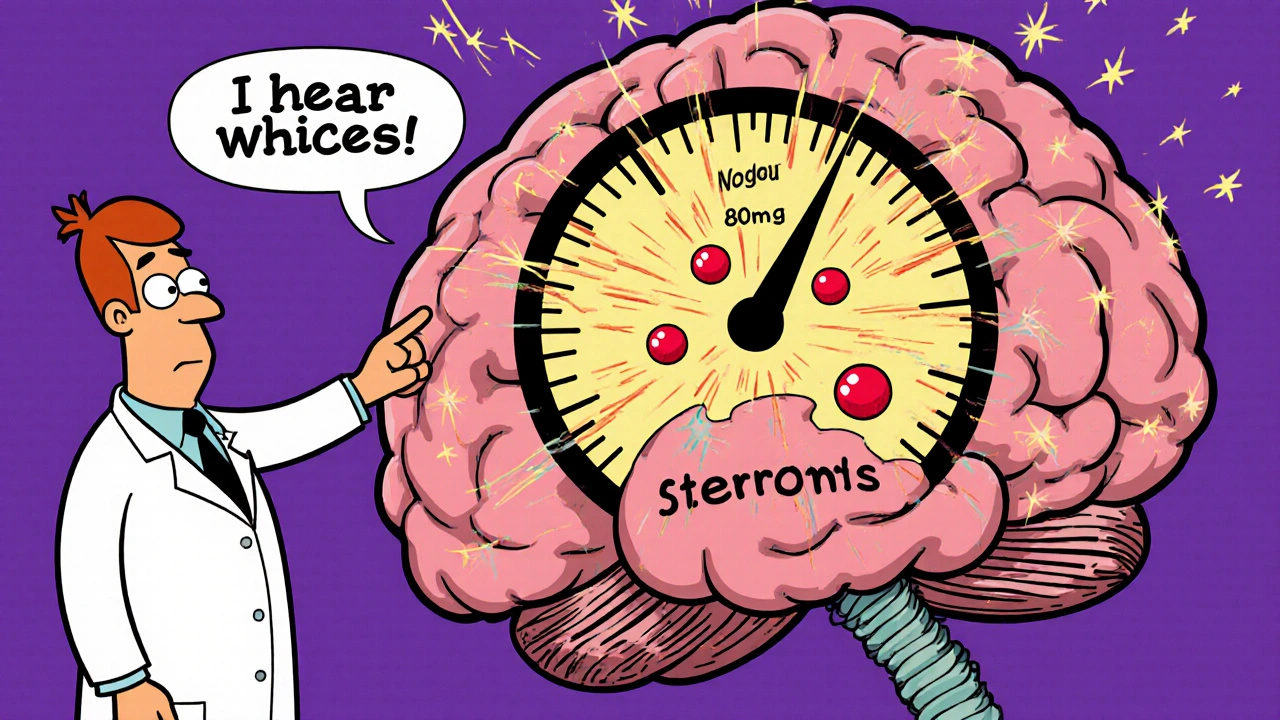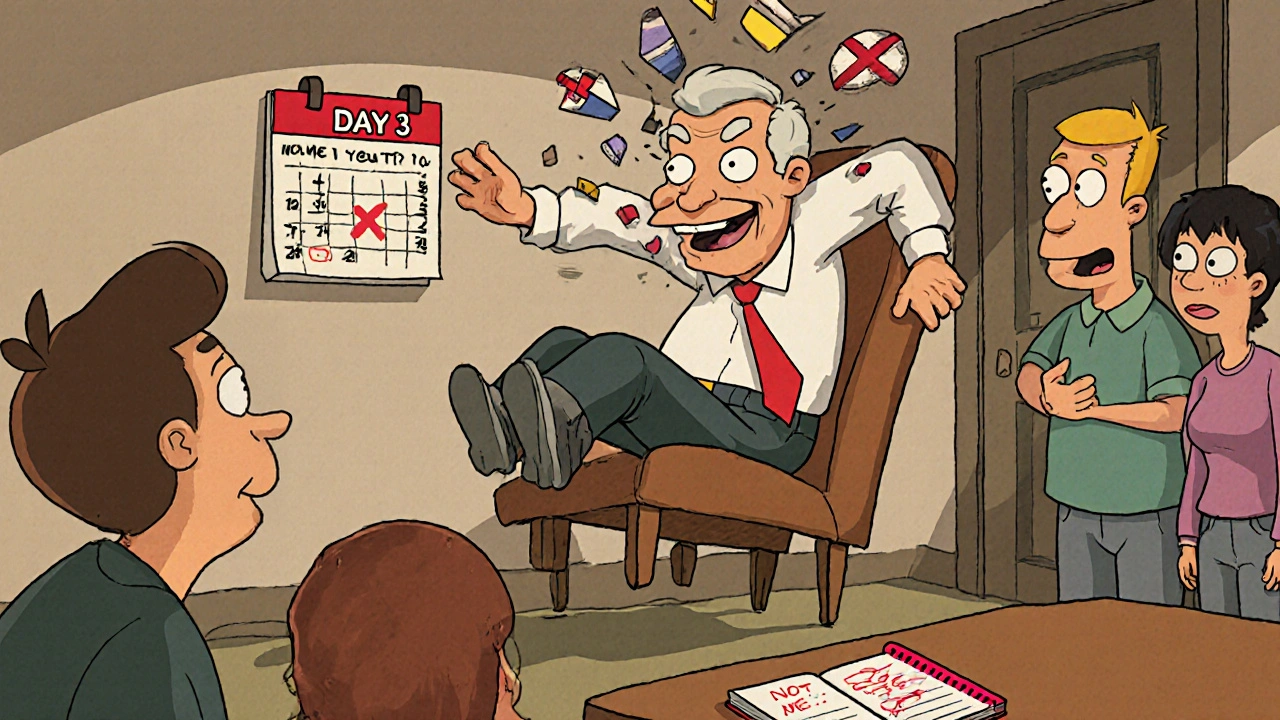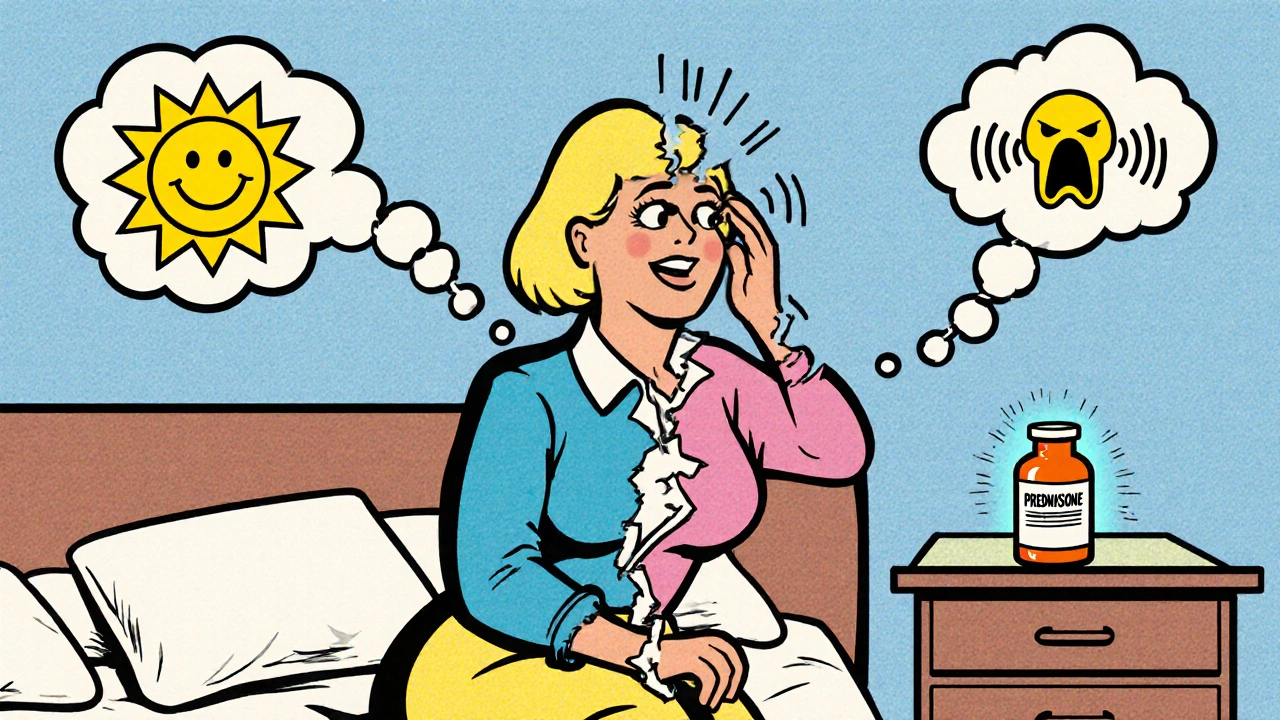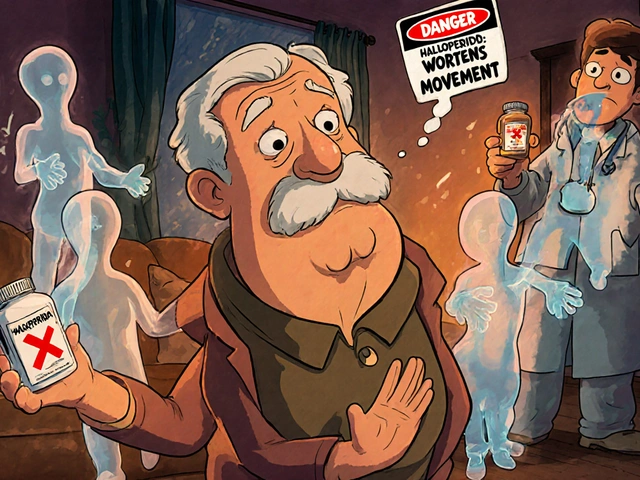Steroid Psychosis Risk Calculator
How Risky Are Your Steroids?
Based on data from the article: 1.3% risk at doses < 40mg, 18% risk at 80mg+
Your Risk Assessment
What to Watch For
Symptoms can appear within 72 hours of starting steroids:
- Euphoria or irritability
- Insomnia or racing thoughts
- Personality shifts or delusions
- Hearing voices or believing things that aren't true
When you take corticosteroids for asthma, rheumatoid arthritis, or a flare-up of lupus, you’re counting on relief - not a mental health crisis. But for some people, these powerful anti-inflammatory drugs can trigger sudden mood swings, paranoia, hallucinations, or even full-blown psychosis. It’s not rare. It’s not just "being moody." And it’s often missed by doctors and patients alike.
How Common Are Psychiatric Side Effects from Steroids?
About 1 in 5 people taking high-dose corticosteroids like prednisone will experience noticeable mood or behavioral changes. At doses under 40 mg per day, the risk is around 1.3%. But jump to 80 mg or more - a common starting dose for severe autoimmune flares - and that risk climbs to nearly 18%. With roughly 10 million new oral steroid prescriptions written each year in the U.S. alone, this isn’t a fringe issue. It’s a quiet epidemic.
Most people don’t realize steroids can affect the brain. They expect nausea, weight gain, or trouble sleeping. But psychosis? That’s not on the list most patients are given. Yet it happens. And when it does, it can turn a short treatment into a months-long recovery.
What Do These Changes Look Like?
Symptoms don’t always come with a siren. Sometimes, it starts small: you can’t sleep, you’re unusually irritable, or you feel "not like yourself." Then it escalates.
- Euphoria: Feeling overly happy, invincible, or reckless - even when things are going wrong.
- Insomnia: Not just trouble falling asleep, but being wide awake for days with racing thoughts.
- Mood swings: Going from calm to furious in minutes, or crying for no clear reason.
- Personality shifts: A usually kind person becomes suspicious, hostile, or withdrawn.
- Depression: Deep, hopeless sadness that doesn’t lift, even when physical symptoms improve.
- Psychosis: Hearing voices, believing things that aren’t true (delusions), or acting in ways that don’t make sense to others.
These aren’t just "side effects." They’re brain changes. Studies show that verbal memory, attention, and decision-making can dip within days of starting steroids. One patient described it as "a fog that made me forget my own name."
Who’s Most at Risk?
It’s not random. Certain people are far more likely to develop these reactions.
- Women: Multiple studies show women are more vulnerable than men, especially those over 50.
- Older adults: People over 65 have a higher risk, partly because their brains are more sensitive to hormonal shifts.
- Those with a history of mental illness: If you’ve had depression, bipolar disorder, or psychosis before, steroids can trigger a relapse - even years later.
- High-dose users: Anything over 40 mg of prednisone daily is a red zone. Even short courses of 60-80 mg can cause problems.
- People on long-term therapy: The longer you’re on steroids, the higher the chance your brain adapts in unhealthy ways.
And here’s the twist: you don’t need to be on steroids for weeks. Symptoms can hit as early as day two or three. Some patients develop psychosis within 72 hours of starting treatment.

Why Does This Happen?
No one fully understands why steroids mess with the brain - but we know enough to be alarmed.
One theory points to the hippocampus, the part of the brain that handles memory and emotion. Steroids reduce activity there, which can lead to confusion and memory loss. Another theory focuses on dopamine, the brain’s reward chemical. Animal studies show steroids spike dopamine levels - enough to trigger hallucinations and mania.
There’s also the HPA axis - your body’s stress-response system. Steroids suppress it, which sounds good (less inflammation) but throws your whole hormonal balance off. That imbalance can trigger anxiety, depression, and even panic attacks.
And here’s the scary part: symptoms don’t always vanish when you stop the drug. In some cases, psychosis or mania lasts for weeks - or even months - after the last pill. That means the damage isn’t always reversible right away.
What Should You Do If You Notice Changes?
If you or someone you care about is on steroids and starts acting strangely - don’t wait. Don’t assume it’s "just stress."
- Call your doctor immediately. Mention the exact symptoms: "I’m hearing voices," or "I can’t sleep and I feel like I’m losing my mind."
- Don’t stop steroids on your own. Stopping suddenly can cause adrenal crisis - a life-threatening drop in cortisol. But don’t keep taking them if you’re psychotic.
- Ask about tapering. Reducing the dose to under 40 mg/day resolves symptoms in 92% of cases. Sometimes, just cutting the dose in half is enough.
- Request a psychiatric consult. A psychiatrist can help distinguish steroid-induced psychosis from other conditions like schizophrenia or bipolar disorder.
- Get blood tests. Rule out infections, liver or kidney problems, or electrolyte imbalances - they can mimic psychiatric symptoms.
There’s no FDA-approved drug for steroid-induced psychosis. But doctors use low-dose antipsychotics like olanzapine (5-10 mg/day) or risperidone (1-2 mg/day) to calm symptoms. These often work within days. Lithium is sometimes used for mania, but it’s risky - especially in older adults.

What Doctors Often Miss
Many physicians focus only on the physical reason for prescribing steroids - asthma, arthritis, colitis - and overlook the mental side effects. They assume patients will report symptoms. They assume they’ll recognize them.
They’re wrong.
Patients often feel ashamed. They think they’re "going crazy." Family members think it’s "just moodiness." Nurses might chalk it up to "hospital delirium." And by the time someone sees a psychiatrist, the person may already be in crisis - hospitalized, confused, or dangerous to themselves or others.
There’s no standard screening tool. No checklist. No routine question like, "Have you felt unusually elated or paranoid since starting your steroid?" That gap costs lives.
What You Can Do Now
If you’re prescribed steroids:
- Ask your doctor: "What are the mental side effects? What should I watch for?"
- Ask: "Is there a lower dose I can start with?"
- Ask: "Should I tell my pharmacist or family to call you if they notice changes?"
- Keep a daily mood log: Note sleep, energy, irritability, thoughts. Bring it to your next appointment.
- Don’t hide symptoms. Even if you think it’s "not that bad," it might be the first sign of something serious.
If you’re caring for someone on steroids:
- Watch for sudden changes in behavior - especially after a dose increase.
- Don’t dismiss agitation or confusion as "just being tired."
- If they’re talking about things that aren’t real, or seem terrified for no reason - get help now.
The Bigger Picture
Corticosteroids are miracle drugs. They save lives. But they’re not harmless. We’ve been using them for over 70 years, yet we still don’t have a reliable way to predict who will develop psychosis. We don’t have a standard screening protocol. We don’t have a drug approved specifically for this.
It’s a gap in medicine - and it’s dangerous.
Every time a patient is prescribed prednisone, they should be given a clear warning: "This can change your mind. Watch for it. Tell someone if it happens."
Until that changes, awareness is your best protection.
Can corticosteroids cause psychosis even after you stop taking them?
Yes. In some cases, psychotic symptoms like hallucinations or mania can persist for weeks or even months after stopping steroids. This is rare, but documented in multiple case reports. The brain may take time to reset its chemistry after prolonged exposure. If symptoms continue after discontinuation, psychiatric care is essential.
Is psychosis from steroids the same as schizophrenia?
No. Steroid-induced psychosis is caused by a chemical reaction to medication, not a chronic brain disorder like schizophrenia. Symptoms usually resolve with dose reduction or antipsychotics. Schizophrenia, on the other hand, is a lifelong condition with different brain changes and genetic factors. Doctors rule out steroids as a cause before diagnosing schizophrenia.
Are there any natural alternatives to corticosteroids?
There are no natural alternatives that match the power of corticosteroids for severe inflammation or autoimmune flares. Some supplements like turmeric or fish oil have mild anti-inflammatory effects, but they cannot replace steroids in conditions like lupus, severe asthma, or vasculitis. Stopping steroids without medical supervision can be life-threatening.
Can low-dose steroids still cause mood changes?
Yes. While the risk is much lower under 40 mg/day of prednisone, mood swings, insomnia, and irritability can still occur - especially in sensitive individuals. Older adults and those with prior mental health conditions are at higher risk even at low doses.
How long does it take for steroid-induced psychosis to go away?
With proper treatment - such as lowering the steroid dose or adding an antipsychotic - most people see improvement within days to two weeks. Full recovery can take up to a month. If symptoms persist beyond four weeks, further psychiatric evaluation is needed to rule out other causes.
Should I avoid corticosteroids if I’ve had depression before?
Not necessarily - but you need to be monitored closely. If you’ve had depression, bipolar disorder, or psychosis in the past, your doctor should consider this before prescribing steroids. They may start you on a lower dose, schedule more frequent check-ins, or have a psychiatrist on standby. The benefits often still outweigh the risks - but only if you’re watched carefully.






Meredith Poley
October 28, 2025 AT 06:15Corticosteroids are not harmless. They’re chemical sledgehammers, and we treat them like aspirin. I’ve seen patients on 20 mg of prednisone turn into paranoid, sleep-deprived ghosts - and their PCPs just shrugged and said, ‘It’s stress.’
Bhanu pratap
October 28, 2025 AT 16:10This is so real. My aunt was on steroids for lupus and started screaming at the TV like it was plotting against her. We thought she was having a stroke. Turned out, it was the meds. She didn’t recover fully for three months. Doctors need to warn people - not just hand out prescriptions like candy.
Ikenga Uzoamaka
October 29, 2025 AT 07:58Why is this even a question?? People die from this. I lost my cousin to steroid-induced mania - he jumped off a balcony thinking he could fly. They didn't even ask if he was on meds. And now? They still don't screen. This isn't science - it's negligence.!!!
John Greenfield
October 30, 2025 AT 11:18Let me be clear: this isn't a ‘side effect.’ It's a neurological assault. The fact that we don't have mandatory psychiatric screening before prescribing >40 mg of prednisone is a moral failure of modern medicine. The HPA axis isn't a suggestion - it's a biological firewall. And we're torching it with impunity.
Dr. Alistair D.B. Cook
October 31, 2025 AT 18:29Wait - so you're saying that a drug that's been around since the 1950s… still doesn't have a standard screening protocol? That's not incompetence. That's institutional arrogance. And the fact that psychiatrists are only called in after someone's already in the ER? Classic. We're not treating patients - we're running a pharmaceutical convenience store.
Ashley Tucker
November 2, 2025 AT 08:20Of course steroids mess with your head. It's not magic. It's chemistry. And if you can't handle a little brain fog while your arthritis improves, maybe you shouldn't be on them. This country is turning every medical issue into a mental health crisis.
Mathias Matengu Mabuta
November 4, 2025 AT 02:02Actually, the real issue is that this is being framed as a ‘silent epidemic’ - when it's just a predictable pharmacological outcome. The data is clear. The risk is quantifiable. The solution is simple: don't prescribe high doses unless absolutely necessary. The problem isn't the drug - it's the laziness of physicians who don't bother to titrate or monitor. Also, ‘1 in 5’? That’s not epidemic. That’s expected. You're just now noticing because you didn't read the manual.
Allen Jones
November 4, 2025 AT 21:09Did you know the FDA knew about steroid psychosis in the 70s? They buried it. Big Pharma didn’t want to scare people off. And now? They’re selling it as ‘anti-inflammatory magic.’ The same companies that pushed opioids are now pushing steroids. You think this is an accident? Wake up. The brain is just another organ they’re monetizing.
Adam Walter
November 6, 2025 AT 16:39As someone who’s managed autoimmune disease for 18 years, I’ve seen this play out in three different hospitals. The real tragedy isn’t the psychosis - it’s the stigma. When you say ‘I think the steroids are making me hallucinate,’ your doctor either laughs or calls you ‘dramatic.’ I once had to beg for a psychiatric consult while delusional - and they discharged me after 48 hours because ‘you’re not suicidal.’ The system isn’t broken. It’s designed to ignore this.
My advice? If you’re on >40 mg, get a baseline neuropsych eval. Track your sleep, mood, and thought patterns like your life depends on it - because it does. And if your doctor rolls their eyes? Find a new one. This isn’t optional.
jackie cote
November 6, 2025 AT 22:03If you’re prescribed steroids, ask for a mental health check-in at week one. It takes five minutes. You’re not overreacting - you’re being proactive. And if you’re caring for someone on steroids, trust your gut. Sudden changes aren’t ‘just stress.’ They’re a red flag. Don’t wait for a crisis to act.
Camille Mavibas
November 7, 2025 AT 14:13My mom was on prednisone for RA and started talking to her dead husband. We thought she was grieving… until she tried to ‘negotiate’ with the microwave. 🥲 I didn’t know steroids could do that. Now I tell everyone. Please, if you’re on these - keep a journal. And if you see weird behavior - call the doctor. No shame. Just safety.
Shubham Singh
November 8, 2025 AT 14:22People think they’re tough because they ‘tough it out’ - but this isn’t about toughness. It’s about ignorance. My uncle went from gentle grandfather to violent, paranoid wreck in 72 hours. They didn’t even ask if he was on meds. Now he’s on antipsychotics and still can’t remember his grandchildren’s names. This is a crime.
Hollis Hamon
November 10, 2025 AT 11:22I’m a nurse in an ICU. I’ve seen steroid psychosis three times this year. Every time, the patient’s family says, ‘We didn’t know that could happen.’ You’re not alone. But you’re also not powerless. If you’re prescribed steroids, write down your baseline mood. Then check in daily. If you feel off - speak up. Even if it feels silly. Better safe than sorry.
ANDREA SCIACCA
November 11, 2025 AT 10:33They say ‘awareness is your best protection’ - but what if you’re poor? What if you don’t have insurance? What if your doctor doesn’t speak English? What if you’re an immigrant and you’re too scared to say anything? This isn’t just about education - it’s about equity. The people who need this warning the most? They’re the ones who’ll never see it.
Lee Lee
November 13, 2025 AT 07:06So… you’re saying steroids cause psychosis… but the government won’t admit it because they’re scared of lawsuits? And the pharmaceutical companies? They’re just ‘accidentally’ not including it in the patient pamphlets? Hmm. Interesting. So if I take prednisone and start seeing aliens… is that my fault? Or is it because the FDA approved it without a mental health warning? I’m starting to think the whole medical system is a pyramid scheme.